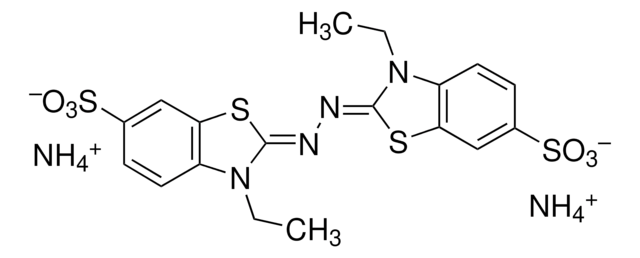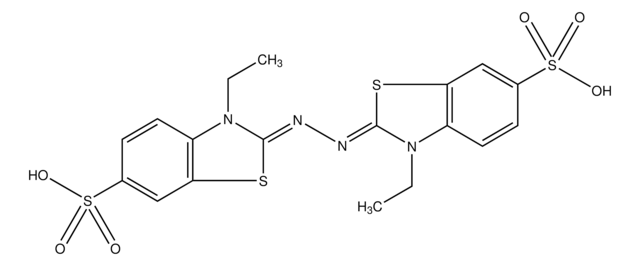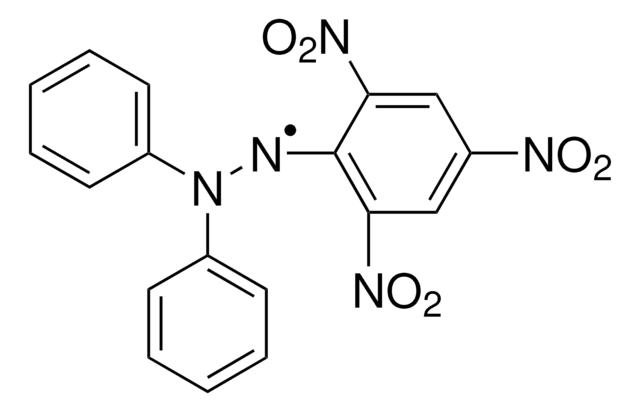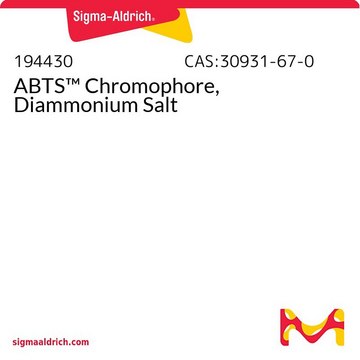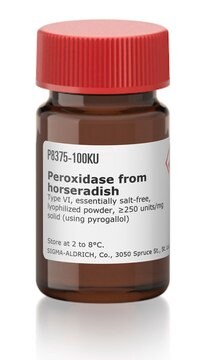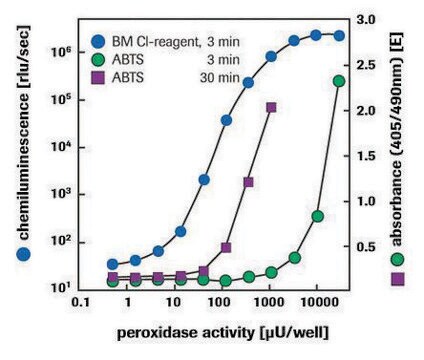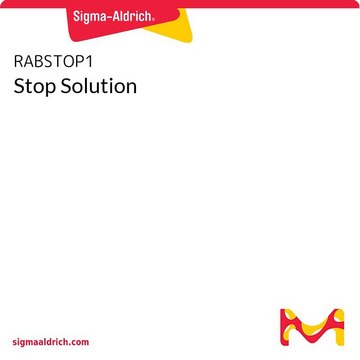11684302001
Roche
ABTS™ Solution
solution (ready-to-use), suitable for ELISA
Synonyme(s) :
ABTS™ Solution, ABTS
Se connecterpour consulter vos tarifs contractuels et ceux de votre entreprise/organisme
About This Item
Code UNSPSC :
12352204
Produits recommandés
Forme
solution (ready-to-use)
Niveau de qualité
Utilisation
sufficient for 1,500-3,000 assays (ELISA)
Conditionnement
pkg of 3 × 100 mL
Fabricant/nom de marque
Roche
Technique(s)
ELISA: suitable
Température de stockage
2-8°C
Description générale
ABTS™ Solution is a ready to use substrate for peroxidase-driven indicator reactions. It contains 2,2-azino-di-[3-ethylbenzthiazoline sulfonate (6)] and H2O2 in glycin/citric acid buffer and is available in slightly green color.
Application
ABTS Solution is a chromogenic substrate for peroxidase in ELISA assays.
Actions biochimiques/physiologiques
2,2′-azino-di-(3-ethylbenzthiazoline sulfonic acid) or ABTS™ acts a substrate for HRP (horseradish peroxidase) conjugate during enzyme-linked immunosorbent assay (ELISA). It is the most sensitive, and stable substrate when compared to three other substrates namely, 5-aminosalicylic acid (5AS), O-phenylenediamine (OPD), O-tolidine (OT). It also produces the best visual results, where it gives a bluish-green color. ELISA using ABTS™ is a highly sensitive, specific and reproducible technique This solution is an excellent substrate for enzyme immunoassays with horseradish peroxidase as a marker enzyme.
Forme physique
Reaction product:
Color: green
Evaluation: photometric (405nm)
Color: green
Evaluation: photometric (405nm)
Remarque sur l'analyse
Absorption: ABTS absorption spectrum reference must always be measured and is determined by a spectrum. The Reference wavelength of 490 nm or higher should be selected due to no measureable absorption. The Reference absorption is usually automatically subtracted by the Plate Reader (background).
Autres remarques
For life science research only. Not for use in diagnostic procedures.
Informations légales
ABTS is a trademark of Roche
Classe de danger pour l'eau (WGK)
nwg
Point d'éclair (°F)
does not flash
Point d'éclair (°C)
does not flash
Certificats d'analyse (COA)
Recherchez un Certificats d'analyse (COA) en saisissant le numéro de lot du produit. Les numéros de lot figurent sur l'étiquette du produit après les mots "Lot" ou "Batch".
Déjà en possession de ce produit ?
Retrouvez la documentation relative aux produits que vous avez récemment achetés dans la Bibliothèque de documents.
Les clients ont également consulté
Sylvia Herter et al.
Molecular cancer therapeutics, 12(10), 2031-2042 (2013-07-23)
We report the first preclinical in vitro and in vivo comparison of GA101 (obinutuzumab), a novel glycoengineered type II CD20 monoclonal antibody, with rituximab and ofatumumab, the two currently approved type I CD20 antibodies. The three antibodies were compared in
Yuanyuan Kuang et al.
EBioMedicine, 57, 102825-102825 (2020-06-20)
Numerous currently incurable human diseases have been causally linked to mutations in connexin (Cx) genes. In several instances, pathological mutations generate abnormally active Cx hemichannels, referred to also as "leaky" hemichannels. The goal of this study was to assay the
Gang Chen et al.
Biomolecules, 11(10) (2021-10-24)
Most recently, a technology termed TRIM-Away has allowed acute and rapid destruction of endogenous target proteins in cultured cells using specific antibodies and endogenous/exogenous tripartite motif 21 (TRIM21). However, the relatively large size of the full-size mAbs (150 kDa) results
Monica Musiani et al.
Nature protocols, 2(10), 2502-2510 (2007-10-20)
PCR is an established technique providing rapid and highly productive amplification of specific DNA sequences. The demand for equally rapid, sensitive and objective methods to achieve detection of PCR products has led to the coupling of PCR with ELISA. PCR-ELISA
H Matsuda et al.
The Japanese journal of experimental medicine, 54(3), 131-138 (1984-06-01)
A micro-technique of enzyme-linked immunosorbent assay (ELISA) using ABTS, 2,2'-azino-di-(3-ethylbenzthiazoline sulfonic acid), as a substrate for horseradish peroxidase (HRP) conjugate was studied. In a comparative study among 4 substrates, namely; 5-aminosalicylic acid (5AS), O-phenylenediamine (OPD), O-tolidine (OT) and ABTS, for
Notre équipe de scientifiques dispose d'une expérience dans tous les secteurs de la recherche, notamment en sciences de la vie, science des matériaux, synthèse chimique, chromatographie, analyse et dans de nombreux autres domaines..
Contacter notre Service technique